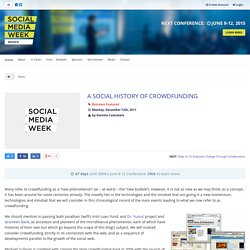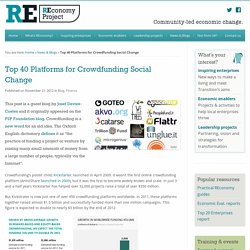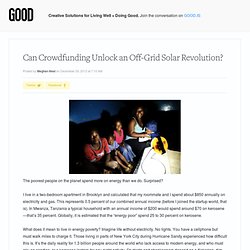

A social history of crowdfunding. Many refer to crowdfunding as a “new phenomenon” (or – at worst – the “new bubble”).

However, it is not as new as we may think; as a concept, it has been around for some centuries already. The novelty lies in the technologies and the mindset that are giving it a new momentum, technologies and mindset that we will consider in this chronological record of the main events leading to what we now refer to as crowdfunding. We should mention in passing both Jonathan Swift’s Irish Loan Fund, and Dr. Yunus’ project and Grameen Bank, as ancestors and pioneers of the microfinance phenomenon, each of which have histories of their own but which go beyond the scope of this blog’s subject. We will instead consider crowdfunding strictly in its connection with the web, and as a sequence of developments parallel to the growth of the social web. Late ‘90s – 2000: Internet campaigning and Charity fundraising Mid 2000: Kiva, Microlending platforms, and Peer-to-peer (P2P) Lending.
Crowdfunding. Top 40 Platforms for Crowdfunding Social Change. This post is a guest blog by Josef Davies-Coates and it originally appeared on the P2P Foundation blog.

Crowdfunding is a new word for an old idea. The Oxford English dictionary defines it as “the practice of funding a project or venture by raising many small amounts of money from a large number of people, typically via the Internet”. Crowdfunding’s poster child, Kickstarter, launched in April 2009. It wasn’t the first online crowdfunding platform (ArtistShare launched in 2003), but it was the first to become widely known and scale. In just 3 and a half years Kickstarter has helped over 32,000 projects raise a total of over $350 million. But Kickstrater is now just one of over 450 crowdfunding platforms worldwide. Source: Crowdfunding Industry Report So, crowdfunding is big and growing fast. An example of particular interest to P2P Foundation readers might be the story of how Jonas Salk created the very first polio vaccine in the 1950s; it is was crowdfunded and patent-free. Web | facebook. Can Crowdfunding Unlock an Off-Grid Solar Revolution?
The poorest people on the planet spend more on energy than we do.

Surprised? I live in a two-bedroom apartment in Brooklyn and calculated that my roommate and I spend about $850 annually on electricity and gas. This represents 0.5 percent of our combined annual income (before I joined the startup world, that is). In Mwanza, Tanzania a typical household with an annual income of $200 would spend around $70 on kerosene—that’s 35 percent. Globally, it is estimated that the “energy poor” spend 25 to 30 percent on kerosene. What does it mean to live in energy poverty? But there’s good news. However, this solar off-grid revolution faces a critical obstacle: access to finance. Here's SunFunder's solution. Help empower lives with solar energy loans HERE. (1) Aenesen, Heck and Pinner, “Solar power: Darkest before Dawn”. A possible answer to community-developer interaction? - Eidos Forums. Quote: Excellent post.

Patronage. It's been around for millennia, supporting artists. The patrons recognise and likes the work of the artist; and, in return, the artist gets funding and a guaranteed audience and sale. It's still being done today, it's not just a medieval phenomenon (do-doo-di-do-do.) William Gibson suggested this as a way to combat piracy of works, when asked about the uploading of his novels in digital form to the internet (of course, it was William Gibson, and he was pretty chuffed about being pirated.)
Of course, this works on the premise that the artist likes creating art, or is the only one involved. One thing that would be great for gaming would be if we finally ditched the middlemen - the publishers and the stores - and went straight to digital distribution, absolutely. However, this would involve a rethinking of games as art, and not a commodity, which is increasingly what they're seen as (hence Guitar Hero: Christian Folk Music or whatever it's up to now.)